Journal of Southern Medical University ›› 2025, Vol. 45 ›› Issue (10): 2111-2117.doi: 10.12122/j.issn.1673-4254.2025.10.07
Yiming SUN1( ), Xinran XU3, Xuerui ZHUO3, Hui CAI1, Yan WANG2(
), Xinran XU3, Xuerui ZHUO3, Hui CAI1, Yan WANG2( )
)
Received:2025-04-24
Online:2025-10-20
Published:2025-10-24
Contact:
Yan WANG
E-mail:15951977608@163.com;524670659@qq.com
Supported by:Yiming SUN, Xinran XU, Xuerui ZHUO, Hui CAI, Yan WANG. C1q-neutralizing antibodies improves postpartum depressive-like behaviors in mice by regulating the C1q/C3 pathway[J]. Journal of Southern Medical University, 2025, 45(10): 2111-2117.
Add to citation manager EndNote|Ris|BibTeX
URL: https://www.j-smu.com/EN/10.12122/j.issn.1673-4254.2025.10.07
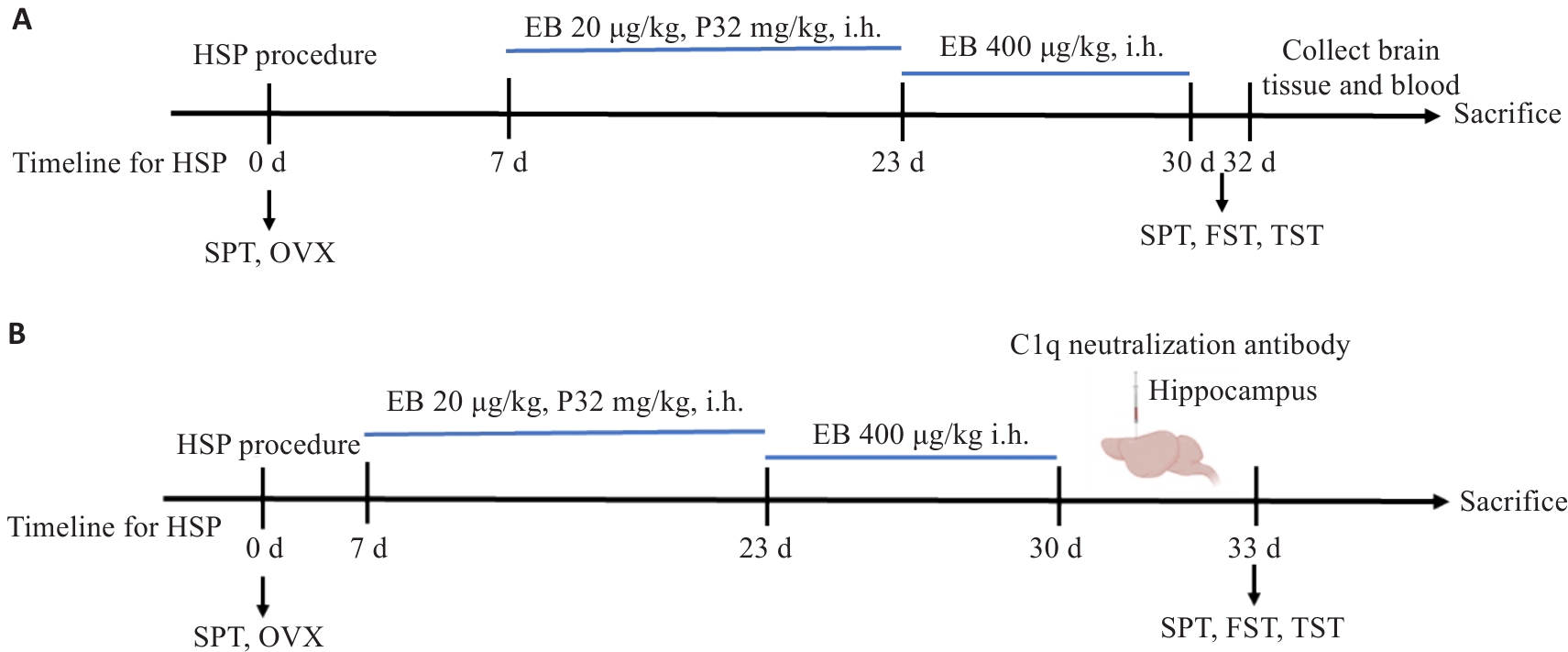
Fig.1 Preparation of the post pattern depression mouse model. A: The preparation process of the postpartum depression model. B: The preparation process of the postpartum depression model and stereotactic injection of C1q neutralizing antibody in the hippocampal brain region.
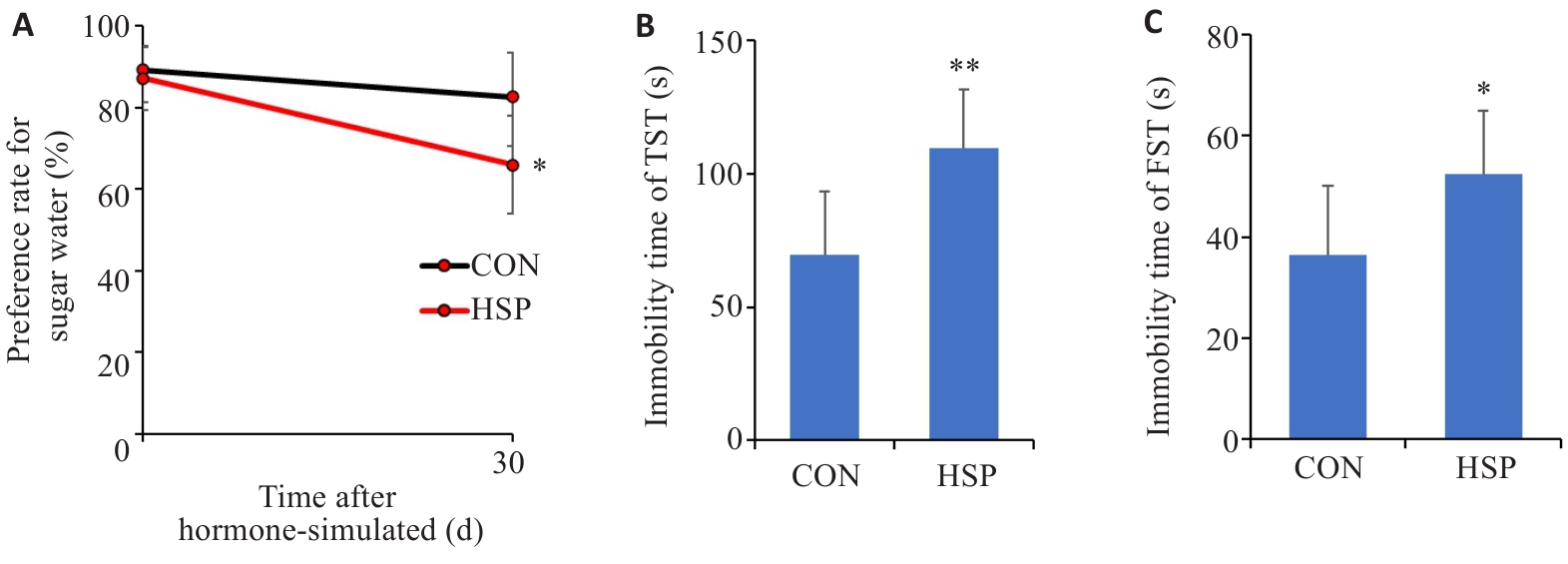
Fig.2 Evaluation of postpartum depression model in mice with hormone-simulated pregnancy (HSP). A-C: Sucrose preference test, tail suspension test and forced swimming test for evaluation of depressive-like behaviors of the mice. *P<0.05, **P<0.01 vs CON.
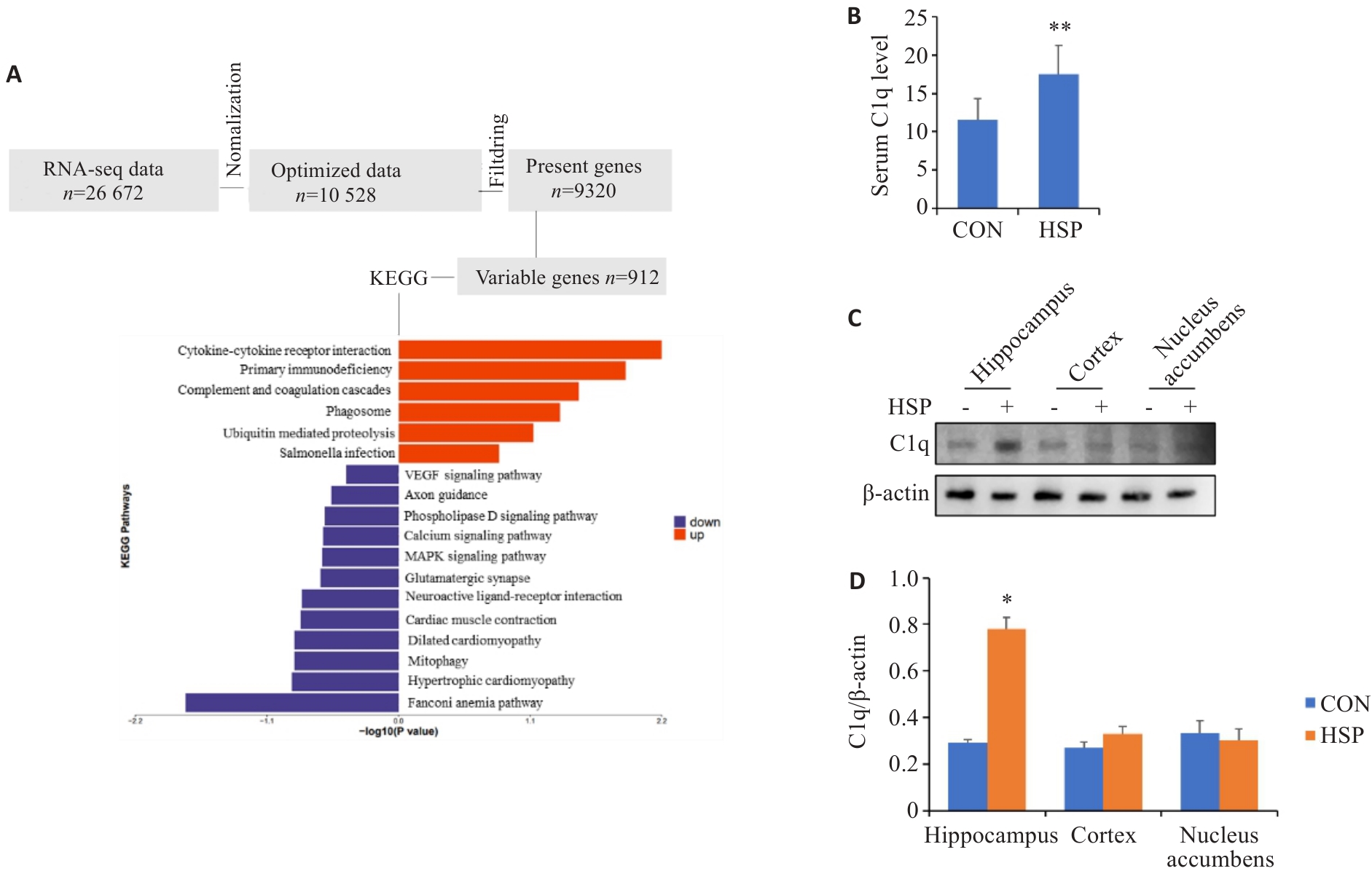
Fig.3 Expression of C1q in the hippocampus of HSP mice. A: RNA sequencing for analyzing differentially expressed mRNAs. B: Serum C1q level of the mice. C, D: Expression of C1q in different brain regions. *P<0.05, **P<0.01 vs CON.
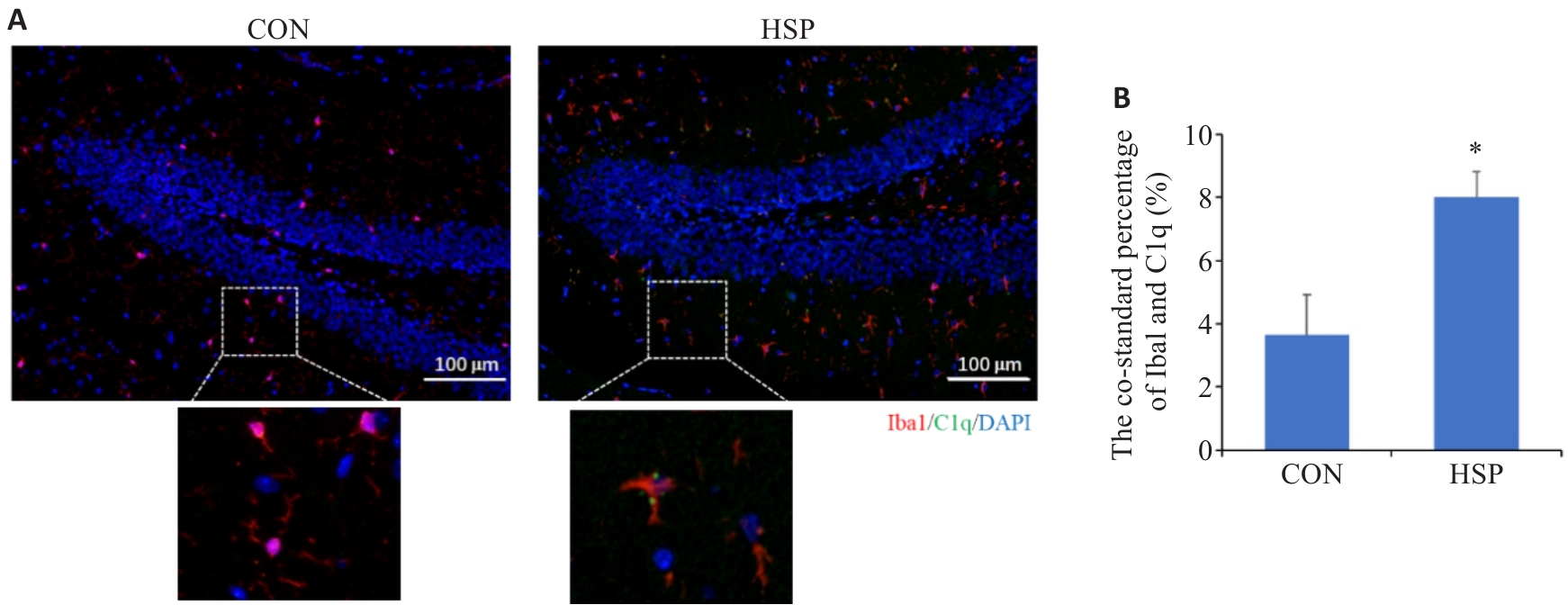
Fig.4 Co-labeling of C1q and Iba1 in the hippocampus of HSP mice. A: Immunofluorescence staining for detecting co-labeling of C1q and Iba1 in the hippocampus (Scale bar=100 μm). B: Quantitative analysis of C1q and Iba1 co-labeling in control and HSP mice. *P<0.05 vs CON.

Fig.5 Peripheral blood C1q level (A) and expression of C1q in peripheral blood mononuclear cells (B, C) in patients with postpartum depression. *P<0.05 vs CON.

Fig.6 Effect of stereotactic injection of C1q-neutralizing antibody in the hippocampus on depressive-like behaviors of HSP mice. A-C: Sucrose preference test, tail suspension test and forced swimming test for evaluation of depressive-like behaviors of the mice. *P<0.05 vs CON+IgG, **P<0.01 vs CON+IgG, #P<0.05 vs CON+C1q Ab.
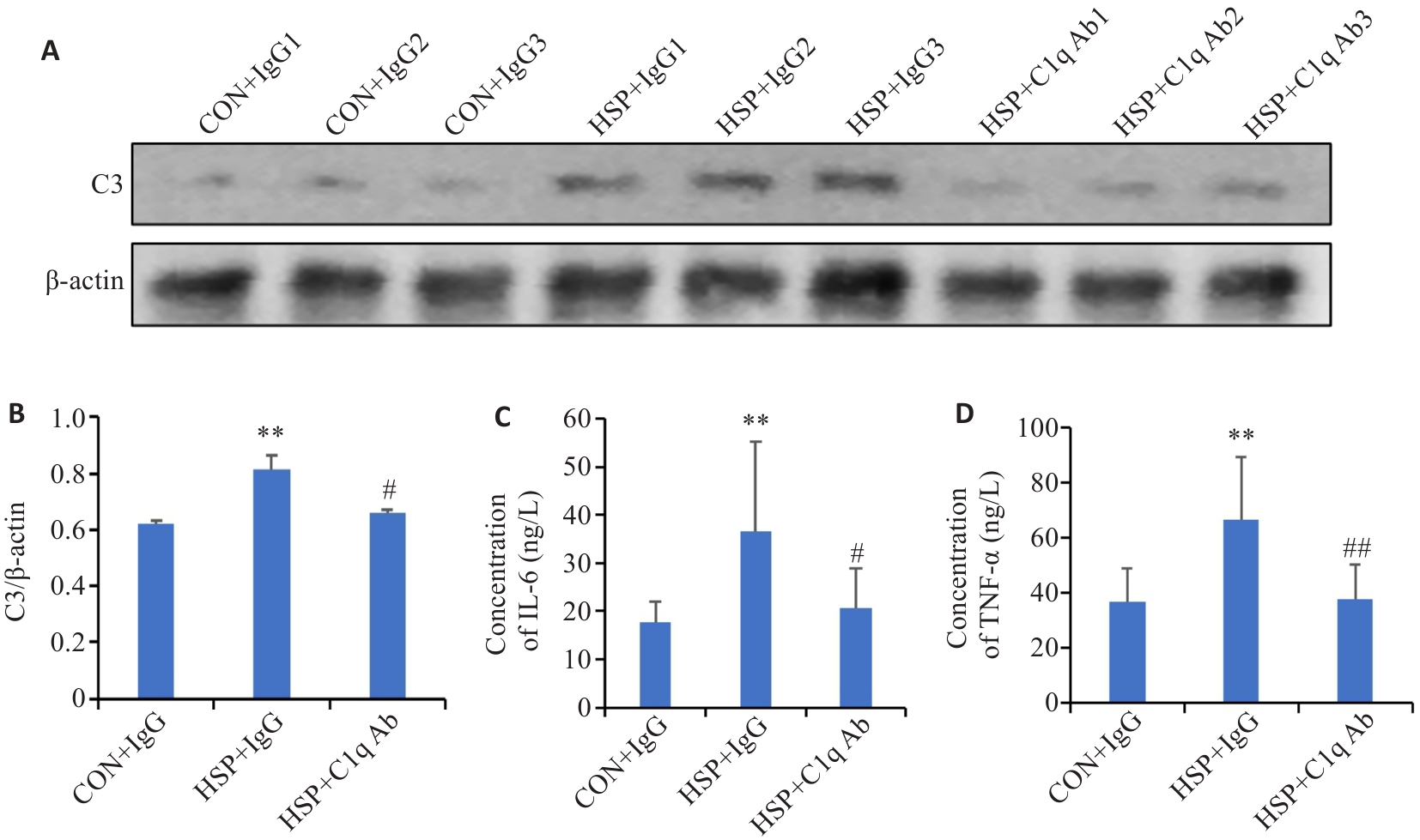
Fig.7 Hippocampal expression level of C3 and serum levels of pro-inflammatory factors in HSP mice following stereotactic injection of C1q-neutralizing antibody in the hippocampus. A, B: Expression of C3 in different brain regions of the mice detected by Western blotting. C: Serum IL-6 level. D: Serum TNF-α level. **P<0.01 vs CON+IgG, #P<0.05 vs CON+C1q Ab, ##P<0.01 vs CON+C1q Ab.
| [1] | Nguyen HTH, Hoang PA, Do TKL, et al. Postpartum depression in Vietnam: a scoping review of symptoms, consequences, and management[J]. BMC Womens Health, 2023, 23(1): 391. doi:10.1186/s12905-023-02519-5 |
| [2] | Pearlstein T, Howard M, Salisbury A, et al. Postpartum depression[J]. Am J Obstet Gynecol, 2009, 200(4): 357-64. doi:10.1016/j.ajog.2008.11.033 |
| [3] | Wells T. Postpartum depression: screening and collaborative management[J]. Prim Care, 2023, 50(1): 127-42. doi:10.1016/j.pop.2022.10.011 |
| [4] | Payne JL, Maguire J. Pathophysiological mechanisms implicated in postpartum depression[J]. Front Neuroendocrinol, 2019, 52: 165-80. doi:10.1016/j.yfrne.2018.12.001 |
| [5] | Stewart DE, Vigod SN. Postpartum depression: pathophysiology, treatment, and emerging therapeutics[J]. Annu Rev Med, 2019, 70: 183-96. doi:10.1146/annurev-med-041217-011106 |
| [6] | Gopalan P, Spada ML, Shenai N, et al. Postpartum depression-identifying risk and access to intervention[J]. Curr Psychiatry Rep, 2022, 24(12): 889-96. doi:10.1007/s11920-022-01392-7 |
| [7] | Gogoleva VS, Mundt S, De Feo D, et al. Mononuclear phagocytes in autoimmune neuroinflammation[J]. Trends Immunol, 2024, 45(10): 814-23. doi:10.1016/j.it.2024.08.005 |
| [8] | Zou HS, Sun MH, Liu Y, et al. Relationship between dietary inflammatory index and postpartum depression in exclusively breastfeeding women[J]. Nutrients, 2022, 14(23): 5006. doi:10.3390/nu14235006 |
| [9] | Madeshiya AK, Whitehead C, Tripathi A, et al. C1q deletion exacerbates stress-induced learned helplessness behavior and induces neuroinflammation in mice[J]. Transl Psychiatry, 2022, 12(1): 50. doi:10.1038/s41398-022-01794-4 |
| [10] | Markarian M, Krattli RP Jr, Baddour JD, et al. Glia-selective deletion of complement C1q prevents radiation-induced cognitive deficits and neuroinflammation[J]. Cancer Res, 2021, 81(7): 1732-44. doi:10.1158/0008-5472.can-20-2565 |
| [11] | Guan PP, Ge TQ, Wang P. As a potential therapeutic target, C1q induces synapse loss via inflammasome-activating apoptotic and mitochondria impairment mechanisms in Alzheimer’s disease[J]. J Neuroimmune Pharmacol, 2023, 18(3): 267-84. doi:10.1007/s11481-023-10076-9 |
| [12] | Kraft AD, McPherson CA, Harry GJ. Association between microglia, inflammatory factors, and complement with loss of hippocampal mossy fiber synapses induced by trimethyltin[J]. Neurotox Res, 2016, 30(1): 53-66. doi:10.1007/s12640-016-9606-8 |
| [13] | 王 睿, 王清波, 谢 婷, 等. 补体系统C1q/C3介导的胶质细胞激活在小鼠抑郁样行为中的作用[J]. 中山大学学报: 医学科学版, 2021, 42(3): 328-37. |
| [14] | Yang J, Li RB, Shi YH, et al. Is serum complement C1q related to major depressive disorder [J]. Indian J Psychiatry, 2020, 62(6): 659-63. doi:10.4103/psychiatry.indianjpsychiatry_394_19 |
| [15] | Wu XM, Gao YZ, Shi CN, et al. Complement C1q drives microglia-dependent synaptic loss and cognitive impairments in a mouse model of lipopolysaccharide-induced neuroinflammation[J]. Neuropharmacology, 2023, 237: 109646. doi:10.1016/j.neuropharm.2023.109646 |
| [16] | Han QQ, Shen SY, Liang LF, et al. Complement C1q/C3-CR3 signaling pathway mediates abnormal microglial phagocytosis of synapses in a mouse model of depression[J]. Brain Behav Immun, 2024, 119: 454-64. doi:10.1016/j.bbi.2024.04.018 |
| [17] | Huo YJ, Chen J, Zhang AM, et al. Roles of complement system in psychiatric disorders[J]. Zhong Nan Da Xue Xue Bao Yi Xue Ban, 2023, 48(10): 1539-45. |
| [18] | Ye BL, Yuan YW, Liu R, et al. Restoring Wnt signaling in a hormone-simulated postpartum depression model remediated imbalanced neurotransmission and depressive-like behaviors[J]. Mol Med, 2023, 29(1): 101. doi:10.1186/s10020-023-00697-4 |
| [19] | Zhu JL, Tang J. LncRNA Gm14205 induces astrocytic NLRP3 inflammasome activation via inhibiting oxytocin receptor in postpartum depression[J]. Biosci Rep, 2020, 40(8): BSR20200672. doi:10.1042/bsr20200672 |
| [20] | Pegoraro S, Balduit A, Mangogna A, et al. Epigenetic regulation of complement C1Q gene expression[J]. Front Immunol, 2024, 15: 1498097. doi:10.3389/fimmu.2024.1498097 |
| [21] | Benavente F, Piltti KM, Hooshmand MJ, et al. Novel C1q receptor-mediated signaling controls neural stem cell behavior and neurorepair[J]. eLife, 2020, 9: e55732. doi:10.7554/elife.55732 |
| [22] | Vadászi H, Kiss B, Micsonai A, et al. Competitive inhibition of the classical complement pathway using exogenous single-chain C1q recognition proteins[J]. J Biol Chem, 2022, 298(7): 102113. doi:10.1016/j.jbc.2022.102113 |
| [23] | Fonseca MI, Chu SH, Hernandez MX, et al. Cell-specific deletion of C1qa identifies microglia as the dominant source of C1q in mouse brain[J]. J Neuroinflammation, 2017, 14(1): 48. doi:10.1186/s12974-017-0814-9 |
| [24] | Mangogna A, Agostinis C, Bonazza D, et al. Is the complement protein C1q a pro-or anti-tumorigenic factor bioinformatics analysis involving human carcinomas[J]. Front Immunol, 2019, 10: 865. doi:10.3389/fimmu.2019.00865 |
| [25] | Won E, Na KS, Kim YK. Associations between melatonin, neuroinflammation, and brain alterations in depression[J]. Int J Mol Sci, 2021, 23(1): 305. doi:10.3390/ijms23010305 |
| [26] | Rupprecht C, Sarker RSJ, Rammes G. Morphological representation of C1q in the aging central nervous system[J]. Pharmacopsychiatry, 2022, 55(4): 203-10. doi:10.1055/a-1704-8260 |
| [27] | Lim G. Perinatal depression [J]. Curr Opin Anaesthesiol. 2021. 34(3): 233-237. doi:10.1097/aco.0000000000000998 |
| [28] | Sharma P, Kalra S, Singh Balhara YP. Postpartum depression and diabetes[J]. J Pak Med Assoc, 2022, 72(1): 177-80. doi:10.47391/jpma.22-002 |
| [29] | Vogel DYS, Heijnen PDAM, Breur M, et al. Macrophages migrate in an activation-dependent manner to chemokines involved in neuroinflammation[J]. J Neuroinflammation, 2014, 11: 23. doi:10.1186/1742-2094-11-23 |
| [30] | O’Hara MW, McCabe JE. Postpartum depression: current status and future directions[J]. Annu Rev Clin Psychol, 2013, 9: 379-407. doi:10.1146/annurev-clinpsy-050212-185612 |
| [31] | Yim IS, Tanner Stapleton LR, Guardino CM, et al. Biological and psychosocial predictors of postpartum depression: systematic review and call for integration[J]. Annu Rev Clin Psychol, 2015, 11: 99-137. doi:10.1146/annurev-clinpsy-101414-020426 |
| [1] | Hanjun ZUO, Zhaoda DUAN, Zhao WANG, Tao GUO, Jinsha SHI, Haolong SHI, Juanjuan LI. Gastrodin improves microglia-mediated inflammatory response after hypoxic-ischemic brain damage in neonatal rats via PI3K/AKT pathway [J]. Journal of Southern Medical University, 2024, 44(9): 1712-1719. |
| [2] | Jinsha SHI, Haonan ZHANG, Xinglin ZHANG, Haolong SHI, Hanjun ZUO, Tao GUO, Zhao WANG, Hang YU, Juanjuan LI. Gastrodin alleviates microglia-mediated inflammatory responses in neonatal mice with hypoxic-ischemic brain damage by regulating CCR5/AKT signaling [J]. Journal of Southern Medical University, 2024, 44(10): 1850-1857. |
| [3] | SUN Xiaopeng, SHI Hang, ZHANG Lei, LIU Zhong, LI Kewei, QIAN Lingling, ZHU Xingyu, YANG Kangjia, FU Qiang, DING Hua. Exosomes from ectoderm mesenchymal stem cells inhibits lipopolysaccharide-induced microglial M1 polarization and promotes survival of H2O2-exposed PC12 cells by suppressing inflammatory response and oxidative stress [J]. Journal of Southern Medical University, 2024, 44(1): 119-128. |
| [4] | SUN Yang, XU Yibo, XIAO Linyu, ZHU Guoqing, LI Jing, SONG Xue, XU Lei, HU Jianguo. Acetylcorynoline inhibits microglia activation by regulating EGFR/MAPK signaling to promote functional recovery of injured mouse spinal cord [J]. Journal of Southern Medical University, 2023, 43(6): 915-923. |
| [5] | ZHANG Jiafa, YANG Canhong, ZHANG Shufen, CAO Tingting, PENG Rui, GUO Weihong, YAN Yuping, XIE Shuting, PENG Xiaojia, LÜ Tianming, HUANG Tianrong. Sulforaphane reverses Aβ fiber-mediated M1 type microglia polarization and neuroinflammation-mediated necroptosis of neural stem cells by downregulating the MAPK/NF-κB signaling pathways [J]. Journal of Southern Medical University, 2023, 43(12): 2132-2138. |
| [6] | CHEN Lixuan, HUANG Dingbang, ZHENG Gang, MENG Xiaojing. Lead exposure aggravates Aβ1-42-induced microglial activation and copper ion accumulation in microglial cells [J]. Journal of Southern Medical University, 2023, 43(10): 1752-1760. |
| [7] | XIONG Ziyu, ZHOU Lepeng, CHEN Jingfen, LI Meng, XIE Rihua. Association between postpartum depression and concentrations of transforming growth factor-β in human colostrum: a nested cohort study [J]. Journal of Southern Medical University, 2022, 42(9): 1426-1430. |
| [8] | ZHAO Jiajia, YANG Heyu, WANG Zhaodi, ZHU Haili, XIE Min. ANA- 12 inhibits spinal inflammation and alleviates acute and chronic pain in rats by targeted blocking of BDNF/TrkB signaling [J]. Journal of Southern Medical University, 2022, 42(2): 232-237. |
| [9] | . Macrophage migration inhibitory factor meditates MPP+/MPTP-induced NLRP3 inflammasome activation in microglia cells [J]. Journal of Southern Medical University, 2021, 41(7): 972-979. |
| [10] | . Postpartum depression: association with genetic polymorphisms of noradrenaline metabolic enzymes and the risk factors [J]. Journal of Southern Medical University, 2019, 39(01): 57-. |
| [11] | . Lipopolysaccharide sensitizes neonatal mice to hyperoxia-induced immature brain injury [J]. Journal of Southern Medical University, 2014, 34(02): 214-. |
| [12] | . Prevalence and risk factors of postpartum depression in Tianhe District of Guangzhou [J]. Journal of Southern Medical University, 2014, 34(01): 113-. |
| [13] | . [J]. Journal of Southern Medical University, 2013, 33(04): 463-. |
| [14] | LI Rui, PENG Ning, DU Fang, LI Xu-ping, LE Wei-dong Department of Neurology, People’s Hospital of Shaanxi Province, Xi’an 710068, China; Health Science Center, Shanghai Institute for Biological Science, Chinese Academy of Science, Shanghai 200025, China. Epigallocatechin gallate protects dopaminergic neurons against 1-methyl-4-phenyl-1,2,3,6-tetrahydropyridine-induced neurotoxicity by inhibiting microglial cell activation [J]. Journal of Southern Medical University, 2006, 26(04): 376-380. |
| [15] | ZOU Xi-feng1, ZHANG Hai-yan2, ZHAO Chun-li2, LI Tie-lin1, XU Qun-yuan2. Differentiation of bone marrow-derived stem cells in injured rat brain tissue [J]. Journal of Southern Medical University, 2004, 24(10): 1102-1106. |
| Viewed | ||||||
|
Full text |
|
|||||
|
Abstract |
|
|||||